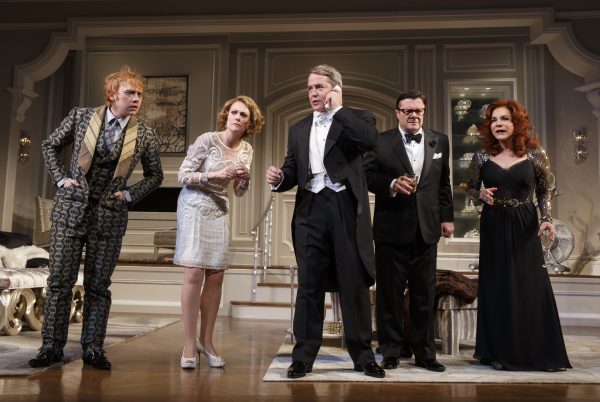It's Only a Play

(© Joan Marcus)
Rarely does one see the chief critic for The New York Times ogled like he's Jennifer Aniston at the wedding of Brad Pitt and Angelina Jolie. But considering that most of the first act of Terrence McNally's It's Only a Play revolves around a group of Broadway thespians waiting with bated breath for that critic's opening-night verdict, he is practically the show's eighth character. Such self-aware comedy can be quite amusing, especially when delivered to an adoring audience by a cast of genuine Broadway stars. But after a while this exercise becomes draining as the play winks harder and harder at the audience, desperately trying to elicit each laugh and round of applause.
The Broadway debut of It's Only a Play has been long in the making: Originally called Broadway, Broadway, it closed during a 1978 out-of-town tryout in Philadelphia. After heavy revisions, it went on to successful runs as It's Only a Play (1982 off-off-Broadway and 1986 off-Broadway with Manhattan Theatre Club). McNally has further revised this metatheatrical comedy to include a whole host of names and references to the theater of 2014, but the basics of the plot remain the same.
Hot "young" playwright Peter Austin (Matthew Broderick) is making his Broadway debut with The Golden Egg, a "comedy with serious overtones." His best friend, television star James Wicker (Nathan Lane), turned down the lead role. He's secretly hoping for the bad reviews that will vindicate his decision. Meanwhile, hard-partying Hollywood actress Virginia Noyes (Stockard Channing) is making her big Broadway return, ankle monitor in tow. British enfant terrible and critics' darling Sir Frank Finger (Rupert Grint) has directed the project. He's also looking forward to the negative reviews that will prove he's not a commercial sellout. As an opening-night party for the ages takes place downstairs, they all gather in the master bedroom of an Upper East Side townhouse belonging to investor-cum-producer Julia Budder (Megan Mullally) to nervously await the notices, especially the all-important Times decree.
F. Murray Abraham delivers a delightfully unsettling performance as Ira Drew, New York's most vicious critic. He laughs idiotically at his own bad puns and seems to be suffering from some sort of debilitating social impairment. (Spot-on character research.) As Wicker, Lane is playing the loudmouthed New York actor everyone has come to expect when they think of him, but with a hit television series.
Broderick floats along in his habitual typecast of the milquetoast, albeit an entirely more sanctimonious variation. He ironically pontificates about the importance of serious new American plays on Broadway in the middle of this star-studded revival of a silly and rather self-involved work. In stark contrast to Broderick's tiresome church-boy routine, Channing is charmingly surly, at one point glowering out at the house while complaining about the "senior citizens…on comps and headsets" that make up Broadway preview audiences.
Mullally's Julia Budder is as fantastically rich and improbably squeaky as Karen Walker (her famous role from TV's Will & Grace), but much nicer and far more clueless. She steals many a moment with her naïve misquotes, which are never corrected by the pseudo-employees around her. Meanwhile, newcomer Micah Stock makes a memorable Broadway debut as fresh-off-the-bus cloakroom attendant Gus P. Head. Few people will soon forget his fierce eleven-o'clock performance of the Wicked showstopper "Defying Gravity."
In lampooning these familiar theater types, McNally sends a satirical valentine to Broadway. Unfortunately, his jokes are likely to land hardest with those employed in the industry and the hopelessly devoted. Everyone else will politely laugh while secretly struggling to keep up with the avalanche of D-list celebrities mentioned. I've never heard so many Broadway personalities namedropped with such frequency, and I work as a theater journalist. The witty one-liners and catty gossip make the entire thing feel like an excuse to stage the best shade thrown during a fabulous brunch at Joe Allen, where the only thing worse than being talked about is not being talked about.
That's not to say there isn't a tremendous amount of well-executed craft at work. Set designer Scott Pask has constructed an idyllic terrarium for the tastelessly rich, complete with a glass-encased fireplace and platinum stationary bicycle. Ann Roth performs the Herculean task of satirizing the costumes of over a dozen currently running Broadway shows. We never even have to hear the name "Lady Gaga" before we instinctively know that the bubble coat sprawled out on the bed is hers. Under the competent direction of Jack O'Brien, the production glides along with the zaniness of a particularly good farce.
That is, until the last half hour, when the play screeches to a grinding halt as the author searches for an ending. It's at this point that humor turns to desperation as the whole ludicrous concept implodes. The talented actors of the ensemble are left to mug and chew scenery as fast as they can. All things considered, I'd much rather be at the party downstairs.










